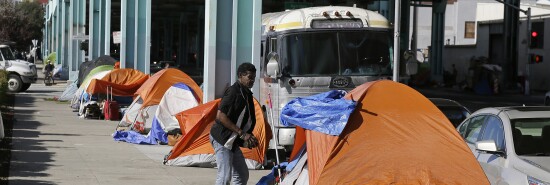
San Diego is ignoring the homeless
Briana Oser
Video Embed
San Diego is ignoring its homelessness problem by shoving its poor into a small ghetto called “the Bottoms.”
According to recent San Diego data, the area is populated by nearly 2,000 homeless folk.
The police do not touch the area despite drug abuse and constant violence. And on Tuesday night, the city council passed a ban called the Unsafe Camping Ordinance, which will prohibit homeless people from setting up tents in public areas if there is space in shelters. The law will also ban tents from certain areas, such as parks and schools, even if there is no space in shelters.
BIDEN’S LAND GRAB HURTS WORKING PEOPLE
The council proposed the ban because homelessness has caused unsafe conditions for San Diego residents, like the scattering of hazardous trash and dirty needles on the ground.
But what about the homeless themselves?
San Diego councilman Kent Lee said in a statement: “Without significant increases in shelter capacity, this item makes a promise to the public to dramatically reduce encampments — one we simply cannot deliver on while setting taxpayers up for millions of dollars in costly litigation and diverting scarce public safety resources from addressing violent crime.”
Barbara Pinto, a member of a housing justice organization called the Alliance of Californians for Community Empowerment, said the new ban is the equivalent of “pouring water on a drowning man.”
In an exclusive interview with Fox News, a resident of the Bottoms commented on the lack of effort the mayor-council government puts into the homelessness crisis. He said that he observed a city councilor pass by the area who “was not talking to any of the homeless, he wasn’t coming to us. He can pop a tent up right next to mine, and he can stay out here for 24 hours with us. He can see what it’s like.”
In other words, San Diego politicians are actively ignoring the marginalized.
Homeless people are human beings. This means that all of their problems cannot be solved by putting a roof over their heads. They need more than overcrowded shelters, where they will be spat on, stolen from, and beaten up. The violence in the Bottoms will continue in shelters and the crowdedness will make matters worse.
Kate Monroe, the CEO of Vetcomm, a business that deals with the problems of homeless veterans, suggested a more holistic approach to homelessness. She, unlike most of the San Diego council, explored the Bottoms and observed the situation.
At one point, Monroe noticed a street with signs that said, “No drugs on this block.” She proposed that San Diego solve the problem in increments, starting with this big group that stays off drugs and applies for jobs every day.
Then, Monroe suggested that the city try to work with those struggling with mental health. And finally, the city should focus on people with drug addictions. These are the people whose crises will definitely not be solved with mere housing.
It seems as though the San Diego council understands the word “homelessness” in its most literal sense. But homelessness is not a choice. We cannot solve it by putting a roof over everyone’s heads. Each individual has his or her own story, a personal struggle, or an economic difficulty. The marginalized are not a collective and identical whole.
Sometimes, as Bottom residents reflect, we can understand this through eye contact and a conversation. Each person in the crisis deserves to be met with heartfelt empathy that is grounded in reality.
CLICK HERE TO READ MORE FROM THE WASHINGTON EXAMINER
And, as Lee reflected, the ban will not just affect the homeless. Residents will have to deal with the possibility of an increased crime rate because police resources will be overextended.
The Unsafe Camping Ordinance will affect San Diego’s entire population. It will encourage violence in shelters and harm taxpayers. Worst of all, it will send the message that homeless people are nothing more than dirty needles and decomposing waste.
Briana Oser is a summer 2023 Washington Examiner fellow.
